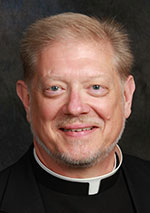That All May Be One / Fr. Rick Ginther
The Word of God is an interreligious link to people of faith
 Pope Francis has declared the Third Sunday in Ordinary Time, on Jan. 26 this year, to be the “Sunday of the Word of God.”
Pope Francis has declared the Third Sunday in Ordinary Time, on Jan. 26 this year, to be the “Sunday of the Word of God.”
He stated this in his apostolic letter “Aperuit illis.” “He opened their minds to understand the Scriptures” (Lk 24:45). It was issued “motu proprio” by the pope on his own initiative and personally signed by him on Sept. 30, 2019.
The immediate change this brings about for Roman Catholics is liturgical: the name has changed.
The far-reaching change sought by Pope Francis: a designated annual celebration that holds up the word of God. We recognize that word as an essential expression of divine communication central to our life as Catholic Christians.
The word of God. God speaking to humanity. God speaking to believers. God revealing God’s self and God’s will for humanity. In Christ.
For ecumenical relations, this is our essential starting place.
Whenever Christians gather, our first commonality is our baptism. That baptism is rooted in God’s revelation in Christ.
It should not surprise us, then, that the immediate response to this commonality would be prayer. And to pray with and through God’s word.
Last Sunday, Jan. 19, was an example: the annual Week of Prayer for Christian Unity. At a local prayer service, the entire focus was based on Acts 27:18-28:10, specifically, “They showed us unusual kindness” (Acts 28:2).
Through such scripturally based wisdom, those present were encouraged to embody unusual kindness toward the stranger.
When the Irvington Association of Ministers Lenten prayer services take place each Wednesday evening in Indianapolis during Lent, it is the word of God all gather to hear and reflect upon. From this, we lift the needs of the communities from which we come, and the larger community in which we live. We note our “oneness” in Lent and in need, even as we are not fully one.
Each year at the National Workshop on Christian Unity, we open the four days with a joint prayer service. The word of God is central to that prayer. The entire gathering takes place rooted in Jesus’ own words: “that all may be one” (Jn 17:21).
Each day we have Scripture study. A skilled presenter leads us in reflection on designated passages.
In 2015, study was led by Amy-Jill Levine. A university professor of New Testament and Jewish Studies at Vanderbilt University in Nashville, Tenn., Levine is Jewish. She brought to select passages of the New Testament the ancient knowledge, cultural and linguistic understandings of the ancient Jewish community. Talmud, Torah and Christian Testament met!
The word of God is truly an interreligious link. We share God’s word with Judaism in the ancient texts of the Old Testament.
We share the Psalms, that great collection of sung poetry. They fire our religious imaginations and give us a text we can pray together.
It is true that we differ in how we understand the truths found within the word (e.g., our “Christ” approach to some passages vs. their mosaic covenant approach). But Christians and Jews honor, cherish and love the word for its revealing God as Creator, as a source of redemption and a sanctifier of the realities of our lives.
The Third Sunday in Ordinary Time is now the “Sunday of the Word of God.”
Yet, in truth, each day is a day of the word of God—for Catholics, Christians and Jews.
(Father Rick Ginther is director of the archdiocesan Office of Ecumenism and Interreligious Affairs. He is pastor of Our Lady of Lourdes Parish, Indianapolis.) †
 Pope Francis has declared the Third Sunday in Ordinary Time, on Jan. 26 this year, to be the “Sunday of the Word of God.”
Pope Francis has declared the Third Sunday in Ordinary Time, on Jan. 26 this year, to be the “Sunday of the Word of God.”